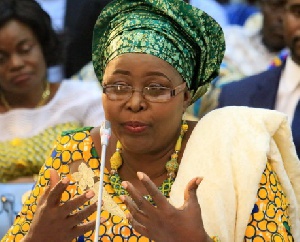 Hajia Alima Mahama, Minister for Local Government and Rural Development
Hajia Alima Mahama, Minister for Local Government and Rural Development
Hajia Alima Mahama, Minister for Local Government and Rural Development (MLG&RD), on Wednesday said the Internally Generated Funds (IGF) continues to play the vital role in the development of the Metropolitan, Municipal and District Assemblies (MMDAs).
She said the IGF was the only source of revenue besides grants that creates a social contract between the assemblies and the rate payer to provide the needed social and infrastructure services to the people.
Hajia Mahama said this at the inauguration and a two-day workshop for the IGF Technical Working Group in Accra.
The workshop serves as a foundation to the achievement of one of the major priorities of Government and that is improving local revenue generation at the MMDA’s.
It is to coordinate the effective implementation of the strategy and also provide advisory service on IGF initiative and related activities to the Ministry.
Members of the group are drawn from the MLG&RD, Ministry of Finance and Economic Planning, Department of Town and Country Planning (MoF&EP), MMDAs, SfDR-GIZ, Office of the Head of Local Government Service, Inter Ministerial Coordinating Committee on Decentralization, Land Valuation Division of the Lands Commission and Civil Society Groups.
Other members are from the Ghana Revenue Authority, Controller and Accountant General Department, National Development Planning Committee, Institute of Local Government Studies, Process Consultant and the Ghana Integrated Financial Management Systems.
The members of the group are expected to review all IGF assignment and methods currently in place and make recommendations for standard setting, identify operational bottlenecks and challenges of IGF initiatives encountered by MMDAs.
“They are also to identify innovations and best practices of initiatives and make proposals for their replications, take stock of the tools applied by the initiatives and review them for standardization and replication with respect to data formats and software.”
She said the administration and management is a shared responsibility between the MLG&RD and MoF&EP due to the roles of local governance and fiscal policy respectively.
Hajia Alima said various interventions have been undertaken to improve revenue mobilization at the MMDAs level over the years and existing challenges needed to be addressed.
She said Chapter 20 of the 1992 Constitution of Ghana, (article 245) states that Parliament, shall by law, prescribe the functions of the District Assemblies which shall include levying and collecting taxes, rates duties and fees.
“Schedule eight and eleven of the Local Governance Act, Act 936 of 2016, expanded on this and empowered MMDAs to collect revenue from a range of sources to complement Central Government transfers and funding from development partners.”
The Local Government Minister said IGF over the years, constitute a critical component of MMDA’s finances but it has been plagued with structural, administrative and systematic inefficiencies that undermine the ability of MMDAs to realize the full potential of local revenues.
She said recent studies conducted revealed that IGF mobilization in Assemblies were very low and that in some of the assemblies, the revenue collectors do not even collect enough to help pay for their salaries
“In some assemblies IGF could constitute as low as 20 per cent averagely, of the total revenue of an assembly which shows the over dependence of the assemblies on grants and central Government.”
Hajia Alima charged the group to provide advice on new IGF opportunities based on local experiences and International Best Practices, emerging IGF operational and management issues, identify issues to be taken up at Inter-Ministerial level and provide advice to the Ministry and MMDAs in areas of creation of IGF Databases, Fee-Fixing Resolution, Billing, tracking and collection, enforcement of Public-Private Partnership (PPP) arrangement.
“Human Resource requirements, equipment and tools, identify areas for further IGF research and the commissioning of special studies to review operational modalities and methods,” she said.
She extended gratitude to GIZ/Support for Decentralization Reforms (SfDR) for the continuous technical and financial support to the Ministry in the implementation of Decentralization Policy and MMDAs revenue mobilization.